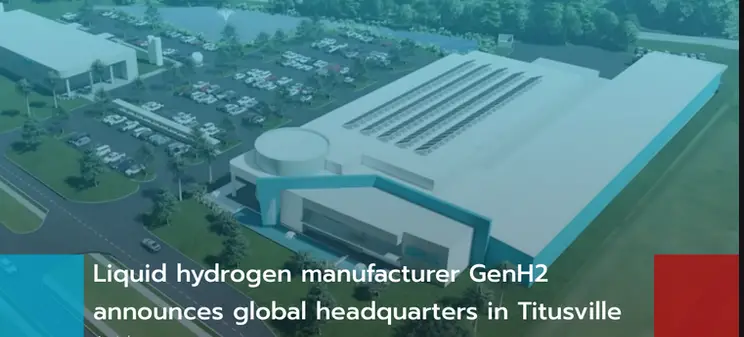GenH2, a manufacturer of liquid hydrogen, has plans of redeveloping an old car dealership property into their new GenH2 HQ. The old property known as the Eckler’s Corvette property which is located in Titusville, Brevard County had been vacant since 2014, but GenH2 recently purchased the site at $6.04 million from Titusville Centroplex LLC, to build their new headquarters.
This new GenH2 HQ will be built through the redevelopment of an existing building on the 10.74-acre site. The old building will then be transformed into 60,000 square feet of lab space and offices, which will later be expanded into 100,000 square feet of space, consisting mostly of manufacturing areas as well as some office space. The construction will also cover a 40-foot by 40-foot hollow cube which will be used as an observation deck for activities such as rocket launches and demonstrations for hydrogen-powered drones.
Also Read Proposed Goodyear Airpark Industrial Facility to be developed in Arizona
Revamping the already existing building to fit the needs of the new GenH2 HQ will cost about $35 million and according to the company the project will be a multi-phase buildout, with the first phase scheduled for completion in about 90 days. The expenses for Phase I are estimated at $4 million and this covers restoration and construction work on the existing building; the demolition of an old warehouse; and upgrading some of the exterior features of a third building on the property.
According to Cody Bateman, the CEO and founder of GenH2, the company had initially considered three places to set up their new GenH2 HQ, which were Florida, Texas and Arizona. All three places were pleasant to work with, but the company ended up settling for Brevard County, in Florida, due to the incentives which were offered by the region.
Bateman pointed out that setting up the GenH2 HQ in Brevard County is also an added advantage, as many of their engineers already live there. He also added, “Since we actually grew up and came from the hydrogen economy here at NASA at Kennedy Space Center, we thought it was only appropriate that we did something closer to home.”

Leave a Reply